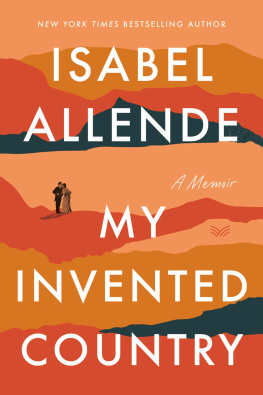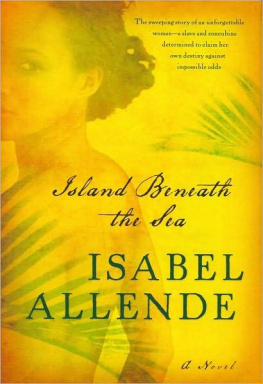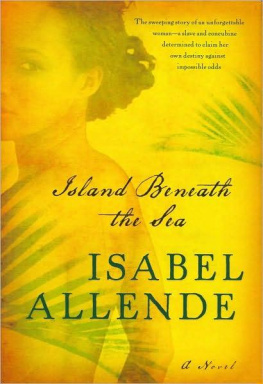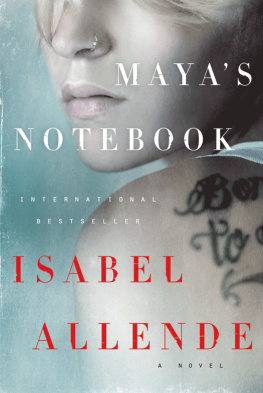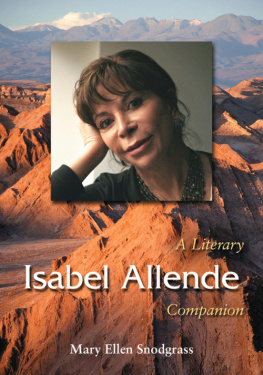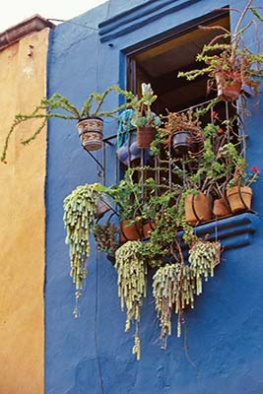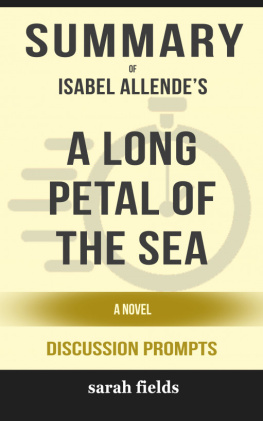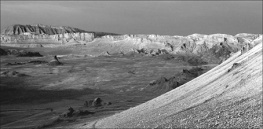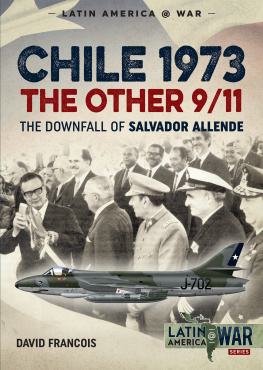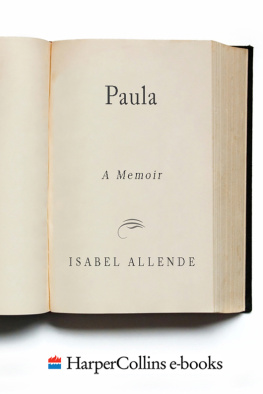Contents
Guide
... for some reason or other, I am a sad exile.
In some way or other, our land travels with me
and with me too, though far, far away, live the
longitudinal essences of my country.
PABLO NERUDA, 1972
Dear Reader,
This book is an exercise in nostalgia. Lets say nostalgia with a sense of humor because I dont trust my memory. I believe what never happened, according to one of my granddaughters.
I have been a foreigner all my life. I was born in Peru, spent my childhood in Chile, and then traveled to several countries following my stepfather, who was a diplomat. After the military coup of 1973 in Chile, I went into exile and spent thirteen years in Venezuela. I have been an immigrant for over thirty years in the United States.
Where are my roots? Where do I belong? If I am asked, my spontaneous answer is that I am Chilean but in truth I have lived in Chile only a few years of my life. I live and work in English, but I write, dream, count, and make love in Spanish. My home is in California, but my strongest memories are from Chile. My husband, my son, my daughter-in-law, my grandchildren, and most of my friends are in the United States, but I am inexorably pulled back to the spectacular land of my childhood. Anyone who has been there will corroborate this: Chile is one of the most beautiful countries in the world.
Chile defined me. In my books I keep going back to that place that I left almost half a century ago, but when I visit it, I feel like a foreigner. One can never return to the past. I dont quite recognize it because it has changed, I have changed, and the world has changed. It is still a country of earthquakes, tsunamis, and other catastrophes, but now it enjoys political, social, and economic stability; it is the most stable country in Latin America. Oh, but I miss its old charm and craziness!
So, my friends, this is an invitation to take my hand and let me be your guide to my invented Chile, the Chile of my incurable nostalgia.
Isabel Allende, 2020
Contents
L ETS BEGIN at the beginning, with Chile, that remote land that few people can locate on the map because its as far as you can go without falling off the planet. Why dont we sell Chile and buy something closer to Paris? one of our intellectuals once asked. No one passes by casually, however lost he may be, although many visitors decide to stay forever, enamored of the land and the people. Chile lies at the end of all roads, a lance to the south of the south of America, four thousand three hundred kilometers of hills, valleys, lakes, and sea. This is how Neruda describes it in his impassioned poetry:
Night, snow and sand compose the form
of my slender homeland,
all silence is contained within its length,
all foam issues from its seaswept beard,
all coal fills it with mysterious kisses.
This elongated country is like an island, separated on the north from the rest of the continent by the Atacama Desertthe driest in the world, its inhabitants like to say, although that must not be true, because in springtime parts of that lunar rubble tend to be covered with a mantle of flowers, like a wondrous painting by Monet. To the east rises the cordillera of the Andes, a formidable mass of rock and eternal snows, and to the west the abrupt coastline of the Pacific Ocean. Below, to the south, lie the solitudes of Antarctica. This nation of dramatic topography and diverse climates, studded with capricious obstacles and shaken by the sighs of hundreds of volcanoes, a geological miracle between the heights of the cordillera and the depths of the sea, is unified top to tail by the obstinate sense of nationhood of its inhabitants.
We Chileans still feel our bond with the soil, like the campesinos we once were. Most of us dream of owning a piece of land, if for nothing more than to plant a few worm-eaten heads of lettuce. Our most important newspaper, El Mercurio, publishes a weekly agricultural supplement that informs the public in general of the latest insignificant pest found on the potatoes or about the best forage for improving milk production. Its readers, who are planted in asphalt and concrete, read it voraciously, even though they have never seen a live cow.
In the broadest terms, it can be said that my long and narrow homeland can be broken up into four very different regions. The country is divided into provinces with beautiful names, but the military, who may have had difficulty memorizing them, added numbers for identification purposes. I refuse to use them because a nation of poets cannot have a map dotted with numbers, like some mathematical delirium. So lets talk about the four large regions, beginning with the norte grande, the big north that occupies a fourth of the country; inhospitable and rough, guarded by high mountains, it hides in its entrails an inexhaustible treasure of minerals.
I traveled to the north when I was a child, and Ive never forgotten it, though a half-century has gone by since then. Later in my life I had the opportunity to cross the Atacama Desert a couple of times, and although those were extraordinary experiences, my first recollections are still the strongest. In my memory, Antofagasta, which in Quechua means town of the great salt lands, is not the modern city of today but a miserable, out-of-date port that smelled like iodine and was dotted with fishing boats, gulls, and pelicans. In the nineteenth century it rose from the desert like a mirage, thanks to the industry producing nitrates, which for several decades were one of Chiles principal exports. Later, when synthetic nitrate was invented, the port was kept busy exporting copper, but as the nitrate companies began to close down, one after another, the pampa became strewn with ghost towns. Those two wordsghost towngave wings to my imagination on that first trip.
I recall that my family and I, loaded with bundles, climbed onto a train that traveled at a turtles pace through the inclement Atacama Desert toward Bolivia. Sun, baked rocks, kilometers and kilometers of ghostly solitudes, from time to time an abandoned cemetery, ruined buildings of adobe and wood. It was a dry heat where not even flies survived. Thirst was unquenchable. We drank water by the gallon, sucked oranges, and had a hard time defending ourselves from the dust, which crept into every cranny. Our lips were so chapped they bled, our ears hurt, we were dehydrated. At night a cold hard as glass fell over us, while the moon lighted the landscape with a blue splendor. Many years later I would return to the north of Chile to visit Chuquicamata, the largest open-pit copper mine in the world, an immense amphitheater where thousands of earth-colored men, working like ants, rip the mineral from stone. The train ascended to a height of more than four thousand meters and the temperature descended to the point where water froze in our glasses. We passed the silent salt mine of Uyuni, a white sea of salt where no bird flies, and others where we saw elegant flamingos. They were brush strokes of pink among salt crystals glittering like precious stones.
The so-called norte chico, or little north, which some do not classify as an actual region, divides the dry north from the fertile central zone. Here lies the valley of Elqui, one of the spiritual centers of the Earth, said to be magical. The mysterious forces of Elqui attract pilgrims who come there to make contact with the cosmic energy of the universe, and many stay on to live in esoteric communities. Meditation, Eastern religions, gurus of various stripes, theres something of everything in Elqui. Its like a little corner of California. It is also from Elqui that our
Next page
